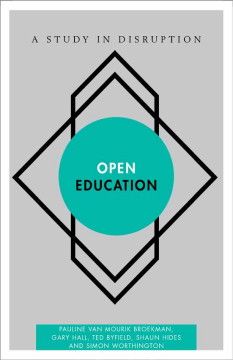
BOOK
Open Education
Pauline van Mourik Broekman | Gary Hall | Ted Byfield | Shaun Hides | Simon Worthington
(2014)
Additional Information
Book Details
Abstract
What for decades could only be dreamt of is now almost within reach: the widespread provision of free online education, regardless of a geographic location, financial status, or ability to access conventional institutions of learning.
But does open education really offer the openness, democracy and cost-effectiveness its supporters promise? Or will it lead to a two-tier system, where those who can’t afford to attend a traditional university will have to make do with online, second-rate alternatives?
Open Education engages critically with the creative disruption of the university through free online education. It puts into political context not just the Massive Open Online Courses (MOOCS) but also TED Talks, Wikiversity along with self-organised ‘pirate’ libraries and ‘free universities’ associated with the anti-austerity protests and the global Occupy movement. Questioning many of the ideas open education projects take for granted, including Creative Commons, it proposes a radically different model for the university and education in the twenty-first century.
Open Education aims at starting new conversations, encouraging a thoughtful engagement with its subjects. Open education emerges through this text as a space of possibility, and opportunity, but also a space which demands an ethical, critical approach.
Jesse Stommel, Assistant Professor at University of Wisconsin-Madison and Director of Hybrid Pedagogy
Pauline van Mourik Broekman, Co-founder, Mute, and Mute collective member.
Gary Hall is Director of the Centre for Disruptive Media at Coventry University, UK, and visiting professor at the Hybrid Publishing Lab—Leuphana Inkubator, Leuphana University, Germany. He is also co-founder (in 1999) of the open access journal Culture Machine, a pioneer of OA in the humanities, and co-founder (in 2006) of Open Humanities Press, which was the first open access publisher explicitly dedicated to critical and cultural theory. He is the author and editor of several books on digital culture and the idea of the university, the best known of which is Digitize This Book!: The Politics of New Media, or Why We Need Open Access Now (2008).
Ted Byfield is a New York–based independent researcher and writer. He served for over a decade on the design faculty of the New School University, and is a former visiting fellow at Yale Law School’s Information Society Project. He co-founded the Open Syllabus Project research network, and since 1998 has co-moderated the mailing list.
Shaun Hides is Head of Department of Media and Co-director of the Disruptive Media Learning Lab, Coventry University, UK. He authored the Department’s Open Media strategy, led a JISC-funded OER project on open-connected teaching innovation and has spoken at numerous events on OER, Innovation and the impact of disruptive technologies on education. He is an advisor to the British Council.
Simon Worthington is a Research Associate at the Hybrid Publishing Consortium—Leuphana Inkubator, Leuphana University, Germany.
Original idea and direction:
Jonathan Shaw is Co-director of the Disruptive Media Learning Lab, Coventry University, UK, visiting fellow at the Centre for Excellence in Media Practice at Bournemouth University and the Chair of the Associate for Photography in Higher Education. He was awarded a Direct Fellowship of Royal Photographic Society (RPS), and a Fellowship of the Royal Society for the encouragement of Arts, Manufactures and Commerce (RSA), in recognition for his achievements in Photography and innovative educational practices.
[Open Education] provides rich material for reflection and further investigation. If the content of this book is likely to be relevant to you, I recommend that you buy a copy for your own use.
An exceptionally lucid study of actually existing practices of ‘open education’, this book is also a passionate call for proactive experimentation with emergent media technologies and forms of collaboration that might yet generate a radically different idea of the university. Sober, critical and energizing in equal measure, Open Education: A Study in Disruption is an indispensable guide to those forces of creative destruction that are currently transforming the academy. It should be read by anyone working or studying in contemporary higher education.
David Cunningham, Institute for Modern and Contemporary Culture, University of Westminster
In a refreshing change from the simplified (and shallow) treatment in popular media, the authors unveil the layers of complexity needed to truly address the concepts of "Disruption" and "Open Education". While it may contain more questions than answers, this is a critical step in looking beyond strategies of solutionism. Grounded in a consideration of the societal, economic, and cultural influences on the future of higher education, combined with the practical experience of Coventry University, this book will be foundational for any institution that wants to have a hand in crafting their own future.
Alan Levine, Learning Technology Consultant and blogger at cogdogblog.com
Table of Contents
| Section Title | Page | Action | Price |
|---|---|---|---|
| Contents | vi | ||
| Preface | viii | ||
| 1 ❖ ❖ The University in the Twenty-First Century | 1 | ||
| 2 ❖ ❖ A Radically Different Model of Education and the University | 21 | ||
| 3 ❖ ❖ The Educational Context | 27 | ||
| 4 ❖ ❖ Open Education | 41 | ||
| 5 ❖ ❖ Open Education Typologies | 49 | ||
| 6 ❖ ❖ Towards a Philosophy of Open Education | 71 | ||
| 7 ❖ ❖ Diverse ‘Disruption’ | 91 | ||
| Index | 105 | ||
| About the Authors | 111 |
